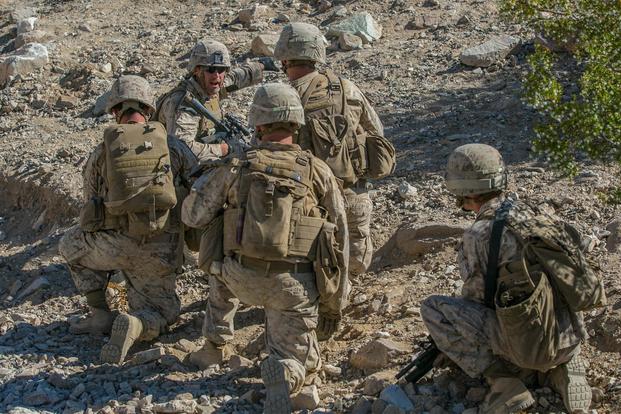Marine officials are reminding squad leaders that there are big bucks for those willing to re-enlist as the service continues its push to professionalize the infantry.
The Marine Corps wants to retain its experienced infantry noncommissioned officers. To get them to stay, officials with Marine Corps Plans, Policies and Operations put out a video message last week highlighting the tens of thousands of dollars in bonus pay they can earn by signing up for another term.
Time is running out for corporals and sergeants to get in on the bonuses, which were first announced last summer.
There's a $10,000 bonus for those willing to spend another two years at their current duty station. Those who re-enlist for four years can earn up to $25,000. Those squad leaders must serve in infantry battalions for at least 24 months. And Marines willing to move into the Squad Leader Development Program can pocket as much as $70,000, but it comes with a six-year commitment, at least three of which must be spent in the operating forces.
The move is part of a multipronged approach to restructure the basic Marine rifle squad. As warfare gets more technical, rifle squads are shrinking down to 12 Marines from 13. That includes an assistant squad leader and a systems operator who will help run drones and other high-tech gear infantry Marines now carry.
The Corps is also experimenting with 15-person squads, which would leave infantry leaders managing additional personnel.
"This is an effort to professionalize the infantry a little more -- to move in that direction of having a more mature infantry cadre," said a Marine official familiar with the bonus push. "We're offering this money because we want to have the best Marines in the right jobs."
That's not to say today's squad leaders aren't hacking it, the official stressed. But the infantry must hold onto as many experienced NCOs as possible.
The Marine Corps has also seen a "disappointingly low" number of grunts earn the squad-leader military occupational specialty, Marine Corps Times reported last year. As of last summer, 359 Marines had moved into the MOS after it was created in 2014.
There's no limit to how many Marines can earn the fiscal 2019 re-enlistment bonuses, but time is running out to apply, said Maj. Craig Thomas, a Manpower and Reserve Affairs spokesman. The deadline is July 31 and, so far, 119 Marines have taken the bonuses, he said.
All the Marine Corps' 648 squad-leader billets are currently filled, Thomas added. But getting Marines to re-up helps ensure rifle squads are persistently staffed by sergeants who’ve completed Infantry Small Unit Leader Course for the next five to seven years.
"This program is intended to provide those mature, experienced and fully trained second-term sergeants additional options to re-enlist and remain in the operating forces to serve as an infantry squad leader," he said.
The target audience are first-term infantry riflemen, machine gunners, mortarmen, assault Marines, and anti-tank missile gunners. Since each re-enlistment option requires time in the operating forces, the infantry will immediately benefit from the NCOs' experience, said Capt. Karoline Foote, a Marine spokeswoman at the Pentagon.
Like other incentive programs, this one is meant to develop a highly qualified and professional career force, she added.
"The Marine Corps has to compete with outside opportunities to retain our best and brightest," Foote said. "Infantry duty is challenging, and we value the experience and expertise of our young infantry Marines. As a result, we are looking to incentivize these Marines to remain in the operating forces and become squad leaders."
Additional details about the bonus options can be found in Marine administrative message 370/18.
-- Gina Harkins can be reached at gina.harkins@military.com. Follow her on Twitter @ginaaharkins.














